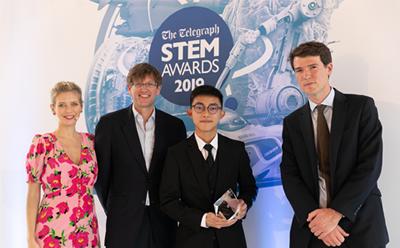Engineering student wins Telegraph STEM Award with aircraft heat management solution

Mechanical Engineering student Jun Ying Yew from the University of Southampton has won the Telegraph STEM Awards 2019 Electrical Challenge with a sustainable idea for heat management and recovery in aircraft.
The third year engineer, whose degree has spanned the University’s Southampton and Malaysia campuses, proposed the solution from an Organic Rankine Cycle (ORC) technology he has explored during his studies.
The Telegraph STEM Awards encourage students to submit ideas that tackle problems across five industry categories. Jun Ying has been named the Rolls-Royce Electrical Challenge winner and received his prize at an awards ceremony in London on 14 June 2019.
“I am overjoyed to be chosen as a winner, this recognition has reinforced my passion for sustainability,” Jun Ying says. “I hope this idea can show that heat recovery can be an integrated part of aircraft design, potentially accelerating the development of hybrid or electric aircraft that will reduce the aerospace industry’s environmental impact.”
Heat management is a key challenge in aircraft electrification, with electric motor heat needing constant removal to prevent overheating.
Jun Ying’s ORC solution is a thermodynamic cycle that has been applied in other industries over the past two decades to recover waste heat. “It became obvious to me that ORC is the most effective heat recovery system we have today, but when I dug deeper I realised there is no relevant research on applying this system to aircraft,” he says.
He proposed using ORC to keep the temperature of electric motors and gas engines within working range, while converting a portion of the waste heat into electricity. He went on to say “Waste heat could also be used to heat air in the cabin, keeping the passengers comfortable.”
“The remaining heat would need to be rejected into the atmosphere at the end of the cycle. I suggested turning the aircraft surface into a big heat exchanger with the help of heat pipes to cool the working fluid in the ORC. This takes advantage of a large surface area, a higher air flow rate during flight and a lower surrounding temperature at higher altitude.”
Jun Ying completed the first two years of his MEng Mechanical Engineering degree at the University of Southampton Malaysia campus. He arrived in Southampton last summer and learned about ORC as part of his third year Individual Project, where he projected the environmental and financial outcomes of retrofitting the technology into the University’s Energy Centre.
“Without studying my core modules, I would not be able to come up with the idea that I proposed,” he says. “I would like to express my deepest gratitude to my Individual Project Supervisor Dr Edward Richardson for his invaluable support and my personal academic tutor Professor Robert Wood who helped gather feedback on my presentation despite his busy schedule.”